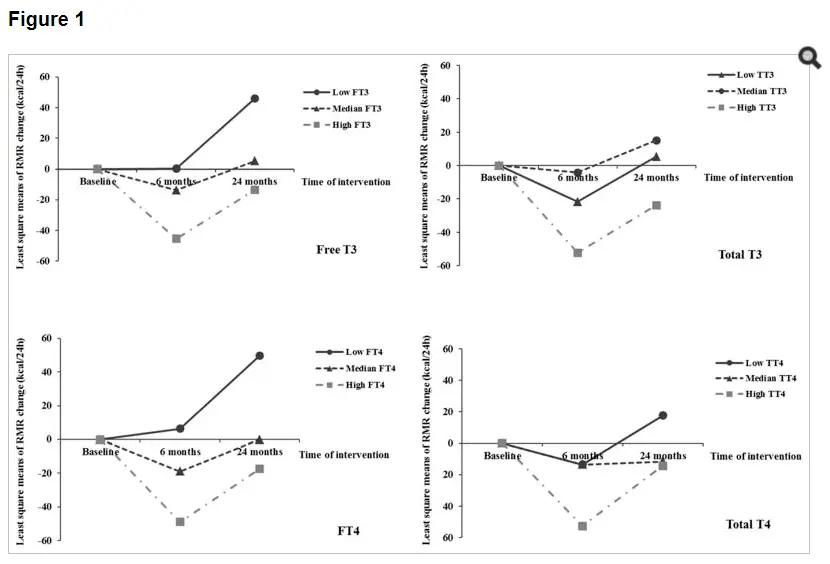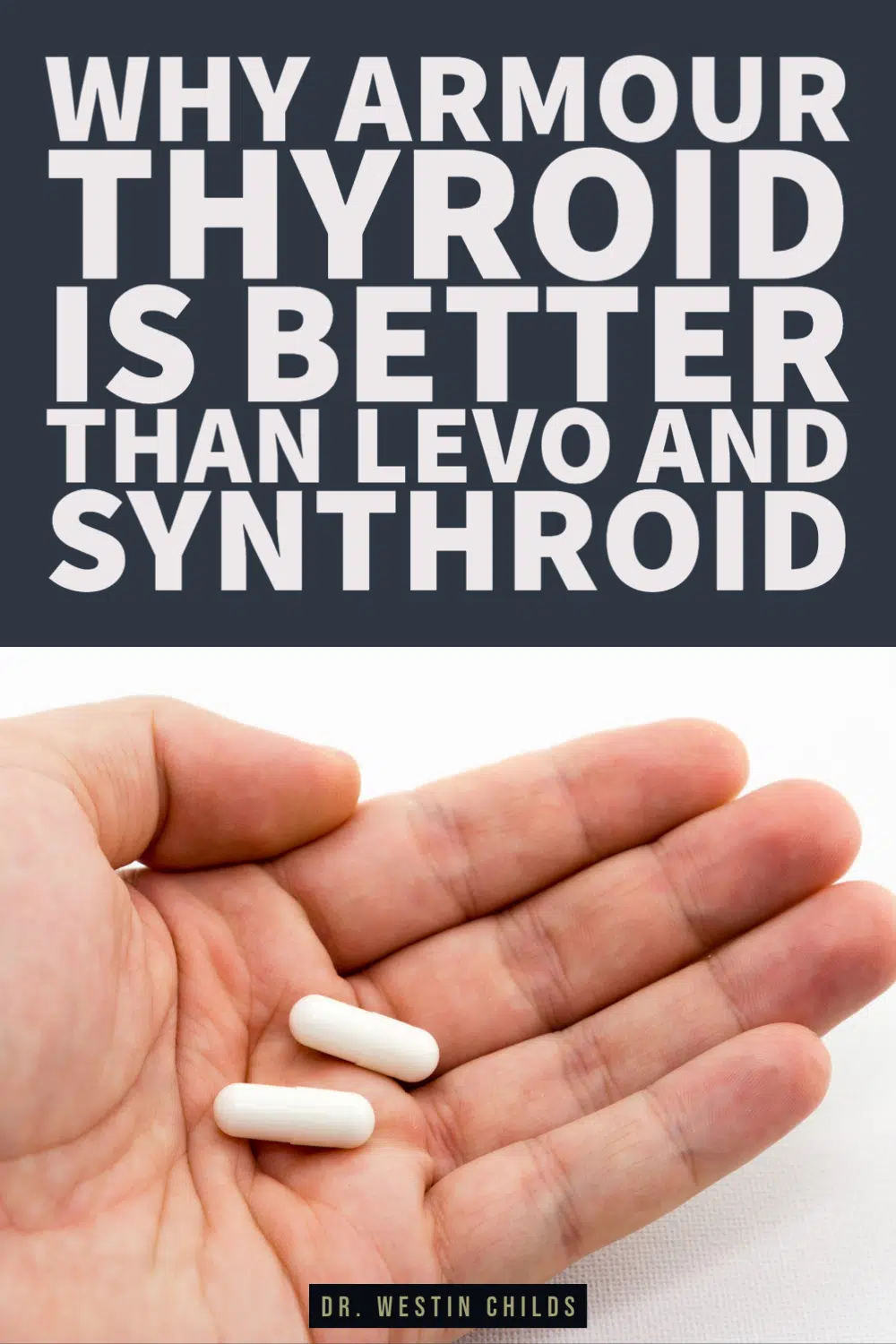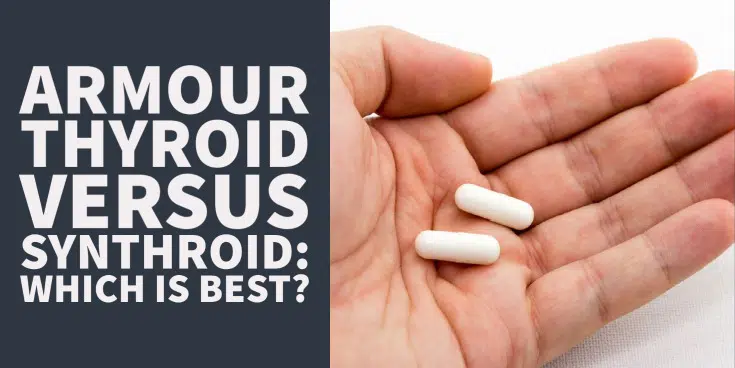Whether you realize it or not thyroid patients have options when it comes to thyroid medications.
If you are taking a medication and it isn’t working for you then you owe it to yourself to learn about ALL of the options available to you.
This post will take a deep dive into the difference between Armour Thyroid and Synthroid including how to determine which one you should use, which one is better for weight loss, and more…
Is there a “Best” Thyroid Medication?
One question that thyroid patients often ask is this:
Am I on the best thyroid medication or which is the best thyroid medication?
They ask because oftentimes they aren’t feeling well on their current medication and they believe that switching medications may be the answer.
They also tend to hear stories about others who have done well on other medications so naturally, they are curious.
But is there really a “best” thyroid medication?
The short answer is no.
Instead of asking that question, it’s better to ask this question:
Which thyroid medication is the best for my body?
This is a much better question to ask and may actually help you on your journey to feel better.
The current standard of care is to use the medication Synthroid (or levothyroxine) to treat all patients with low thyroid function.
The problem is that not all patients respond very well to this medication which creates a unique situation…
One in which some patients have switched to taking other medications and report dramatic results.
So with this in mind let’s talk about some of the other options that are available for thyroid medications such as Armour Thyroid and when you should consider switching to this medication.
Armour Thyroid Explained
PROS
- Contains both T3 & T4 thyroid hormones
- Has a higher satisfaction rate among patients
- Usually results in more weight loss compared to T4-only thyroid medications
- Contains other thyroid hormones and precursors
- Better for patients with high reverse T3
CONS
- May exacerbate Hashimoto’s due to reactivity with the immune system
- May cause more symptoms when compared to Synthroid
- May be more difficult to dose when compared to Synthroid
- May not be tolerated as well as WP Thyroid and Nature-throid
First of all, what exactly is Armour Thyroid?
Armour Thyroid is a thyroid medication used to treat hypothyroidism.
It is unique among thyroid medications for two very distinct reasons:
#1. Is that it contains both the active thyroid hormone T3 and the inactive thyroid hormone T4.
and #2. it is porcine-derived.
That’s right!
Armour Thyroid is desiccated thyroid gland from pigs.
The way that it is processed allows for the inclusion of more thyroid hormones and hormone metabolites than any other thyroid hormone available (except those also within the NDT class).
Armour Thyroid contains ALL of the thyroid hormones that are naturally produced in the thyroid gland of a pig.
The gland is then desiccated (mashed up) and purified before it is put into tablet form.
Patients then ingest this medication as thyroid hormone replacement therapy.
So why do so many people swear by Armour Thyroid and state that it is superior to other forms of thyroid medication?
Part of this reason likely has to do with the fact that Armour Thyroid contains the active thyroid hormone T3.
In each grain of Armour Thyroid, there is about 38mcg of T4 and about 9mcg of T3.
This small amount of T3 is often enough to improve thyroid function in the entire body.
Remember that T3 is much more biologically active when compared to T4 and therefore it is much stronger than T4 medications like Synthroid.
But that’s not all.
Armour Thyroid also contains other thyroid hormones such as T2 (1) and probably other hormone precursors that we can’t measure.
These other hormones and precursors likely help control hypothyroid symptoms in many patients who use this medication.
Are there any drawbacks to using Armour Thyroid?
Well, yes, like any medication there are always side effects to consider.

One is that not all patients respond well, or even need, T3 thyroid hormone.
The use of Armour Thyroid may lead to the symptoms of hyperthyroidism such as rapid heart rate, palpitations, and so on when using this medication.
In addition, some patients with Hashimoto’s Thyroiditis may actually respond with a flare-up in autoimmune symptoms when using Armour Thyroid.
This may have to do with the fact that Armour Thyroid is porcine-derived and porcine
Make no mistake though, the thyroid hormones in Armour Thyroid are bio-identical to your body.
What that means is that the hormones you are consuming when you take this medication are the exact same as the ones your body is supposed to naturally produce.
So if Armour Thyroid works so well why don’t more physicians use this medication?
If you go back in time about 50 years you will find that Armour Thyroid used to be the preferred medication and the dosage used back then was much higher than currently (2).
The shift in preferred medications occurred as Synthroid and Levothyroxine were created.
These medications were thought to be equally effective when compared to Armour Thyroid and were also thought to be better tolerated with fewer side effects.
The problem is that as this shift in preferred thyroid medication was occurring there was also an ever-increasing amount of thyroid patients who were beginning to become unhappy and remain symptomatic.
This probably has to do with the fact that each thyroid patient is unique and the conversion status, amount of thyroid hormone required, and preferred medication should be determined at the individual level and not through a standardized approach.
But here we are!
We now see a large proportion of thyroid patients unhappy with their current treatment and seeking alternative medications and therapies.
The bottom line?
Some patients will do much better than others on Armour Thyroid when compared to Synthroid but this doesn’t mean that Armour Thyroid is a “better” medication.
Some people may still need, and do better, on Synthroid!
DOWNLOAD FREE RESOURCES
Foods to Avoid if you Have Thyroid Problems:
I’ve found that these 10 foods cause the most problems for thyroid patients. Learn which foods you should avoid if you have thyroid disease of any type.
The Complete List of Thyroid Lab tests:
The list includes optimal ranges, normal ranges, and the complete list of tests you need to diagnose and manage thyroid disease correctly!
Synthroid Explained
PROS
- Allows for sustained dosing and more even thyroid serum levels
- Well tolerated when compared to other thyroid medications
- Easy to dose
CONS
- May not work well for all patients
- Does not contain active thyroid hormone (T3)
- May contain inactive fillers and dyes
- May not be ideal for those interested in weight loss
So let’s discuss Synthroid as well…
Synthroid is considered a T4 thyroid medication because it ONLY contains T4 thyroid hormone.
T4 has a longer half-life when compared to T3 and because it is less biologically active, it may be better tolerated as well (4).
Another benefit to providing T4 to the body is that you allow your body to “control” the amount of thyroid conversion that it needs.
And this is a good thing, assuming normal physiologic function in the body.
The problem with using T4-only thyroid medications comes when the person taking this medication suffers from conditions such as systemic inflammation, gut dysfunction or liver dysfunction (5).
All of these conditions may reduce the effectiveness of Synthroid because they may limit your body’s natural ability to convert T4 into the active thyroid hormone T3.
Does this make sense?
So some people may be able to take T4 thyroid hormone but may have difficulty in activating the hormone once it is absorbed into the body.
Another potential issue with Synthroid is that it often contains many inactive fillers and dyes.

These fillers and dyes are not usually an issue, but for some people, they may alter the absorption of the medication in the gastrointestinal tract and they may also cause negative symptoms.
Symptoms such as rashes, abdominal pain, swelling, and headaches may be a sign that you are reacting to one of the inactive ingredients in the medication and not the hormone itself.
So while Synthroid would be considered a very stable and well-tolerated thyroid hormone medication it may not be “strong” enough for certain people.
Especially those people who have other medications conditions or those who have a lot of extra weight to lose.
Which is Better for Weight Loss?
Is one of these medications superior to the other when it comes to weight loss?
The answer is yes!
And we can look at some studies to help us understand how and why.
Take for instance this study:
This study compared patients on Desiccated thyroid extract (remember this is the same class of medications that Armour Thyroid falls into) to those taking Levothyroxine in a randomized, double-blind crossover study.
They were then questioned at the end and asked which medication they preferred.
In addition, their weight was also tested at the end of the study.
The results found that patients not only lost more weight while taking the desiccated thyroid extract but nearly half of those patients who took it expressed that they preferred the thyroid extract over Levothyroxine.

Patients who took the thyroid extract lost around 4 pounds (without changing their diet or exercise routine) and also reported a reduction in their subjective symptoms (such as higher energy levels) in a questionnaire.
This change in weight may not sound significant, but it is important because it highlights the importance of T3 as it relates to metabolic function and weight management.
Often times patients who are on the wrong thyroid medication have a very difficult time losing weight, but once they find their ideal medication they find that they are quickly and easily able to lose weight.
Despite these results (the sample size was only about 70 patients), the researchers concluded that thyroid extract should be considered in some patients.
But this isn’t the only study to suggest that medications that contain T3 thyroid hormone cause more weight loss.
Other studies, such as this one, highlight the importance of both free T3 and free T4 levels as it relates to the ability of patients to lose weight (7).

Those patients who have higher levels of free thyroid hormones lose more weight than those with lower levels.
This information is important because it stands against the conventional therapy of treating based solely on the TSH.
The bottom line?
Between the two medications, Armour Thyroid will likely result in more weight loss when compared to Synthroid.
Dosage for Synthroid & Armour Thyroid
So what do you do if you are interested in switching thyroid medications?
Can you just adjust your dose and be fine?
Unfortunately, it’s not that easy.
The reason we can’t just convert from Synthroid to Armour Thyroid has to do with the fact that Armour Thyroid contains both T4 and T3.
T3 is considered a much more potent thyroid medication when compared to T4.
In fact, from the perspective of pituitary function, T3 is about 3-4x more potent than T4 at suppressing the TSH (8).
So when you convert from T4-only thyroid medication like Synthroid to a combination thyroid medication like Armour Thyroid you have to consider this fact.
This makes conversion difficult, but not impossible.
Perhaps the best way to adjust dosing is to follow these guidelines:
Consider that each mcg of T3 is equal to about 3 mcg of T4.
So 1 grain of Armour Thyroid which contains 38mcg of T4 and 9mcg of T3 may be equal to around 65mcg of T4.
Here is the math for those interested:
38 mcg of T4 = 38 mcg of T4
9 mcg of T3 x 3 (the difference in potency between T4 & T3) = 27 mcg of T4 equivalents
38 mcg of T4 + 27 mcg of T4 equivalents = around 65mcg of T4.
So each grain of Armour Thyroid (which is 60mg) is probably equal to around 65mcg of T4.
But while this information may be useful as a starting point it shouldn’t be followed 100%.
Some patients will find that they are much more sensitive to T3 when compared to T4 and this may limit the amount of Armour Thyroid that they are able to use.
So whenever you alter your thyroid medication it’s best to always follow your free thyroid hormones and your TSH to determine how you are tolerating any medication.
Should you Switch Medications?
Determining if you switch medications should occur in consultation with your current physician.
If you are not tolerating Synthroid (or Levothyroxine) and your physician is unwilling to try other medications then it may be worth trying to find a new thyroid doctor to help you out.
Remember:
Your health is the most important thing that you have!
It’s not worth wasting time on physicians who are not willing to take your symptoms seriously or who are unwilling to work with you.
Also, when you consider other thyroid medications just realize that there are more medications than just Armour Thyroid and Synthroid.
In the T4-only class of thyroid medications, there are other medications such as Tirosint.
In the NDT class of thyroid medications, there are other medications such as WP Thyroid and Naturethroid.
In the T3-only class of thyroid medications, there are other medications such as Cytomel, liothyronine, and SR T3.
You have options!
Final Thoughts
Both Armour Thyroid and Synthroid should be considered safe and effective thyroid medications.
The choice to use one over the other has more to do with your body and your symptoms than inherent differences between medications.
Some patients may do very well on Synthroid while others may do very well on Armour Thyroid.
Determining which one you need should be based on your subjective sense of symptoms, your tolerance to existing thyroid medications, your history of medical conditions, and your history of other factors which may influence the absorption and utilization of thyroid hormone.
Now I want to hear from you:
Are you using Synthroid? Is it working for you?
Are you trying to switch to Armour Thyroid? Is your physician giving you resistance?
Leave your comments below!








